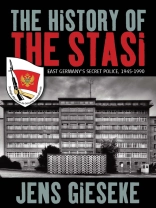A well-balanced and detailed look at the East German Ministry for State Security, the secret police force more commonly known as the Stasi.
“This is an excellent book, full of careful, balanced judgements and a wealth of concisely-communicated knowledge. It is also well written. Indeed, it is the best book yet published on the Mf S.”—German History
The Stasi stood for Stalinist oppression and all-encompassing surveillance. The “shield and sword of the party, ” it secured the rule of the Communist Party for more than forty years, and by the 1980s it had become the largest secret-police apparatus in the world, per capita.
Jens Gieseke tells the story of the Stasi, a feared secret-police force and a highly professional intelligence service. He inquires into the mechanisms of dictatorship and the day-to-day effects of surveillance and suspicion. Masterful and thorough at once, he takes the reader through this dark chapter of German postwar history, supplying key information on perpetrators, informers, and victims. In an assessment of post-communist memory politics, he critically discusses the consequences of opening the files and the outcomes of the Stasi debate in reunified Germany.
A major guide for research on communist secret-police forces, this book is considered the standard reference work on the Stasi.
Table des matières
Preface
Preface to the 2011 edition
Introduction: Ten Years and Ten Days
Chapter 1. Antifascism – Stalinism – Cold Civil War: Origins and Influences, 1945 to 1956
Chapter 2. The Safest GDR in the World – The Driving Forces of Stasi Growth
Chapter 3. The Unofficial Collaborator – A New Type of Informer
Chapter 4. Blanket Surveillance? State Security in East German Society
Chapter 5. Resistance – Opposition – Persecution
Chapter 6. Wolf and Co. – Mf S Operations Abroad
Chapter 7. Final Crisis and Collapse, 1989-90
Chapter 8. Legacy – Aufarbeitung – Culture of Memory: The Second Life of the Stasi
Notes
Select Bibliography
A propos de l’auteur
Jens Gieseke is head of the “Communism and Society” research department at the Centre for Contemporary History in Potsdam, Germany. He previously worked for fifteen years in the research division of the Federal Commissioner for the Stasi Records in Berlin. He co-edited Staatssicherheit und Gesellschaft (Göttingen, 2007); Handbuch der kommunistischen Geheimdienste in Osteuropa (Göttingen, 2008); and Die Geschichte der SED (Berlin, 2011).












